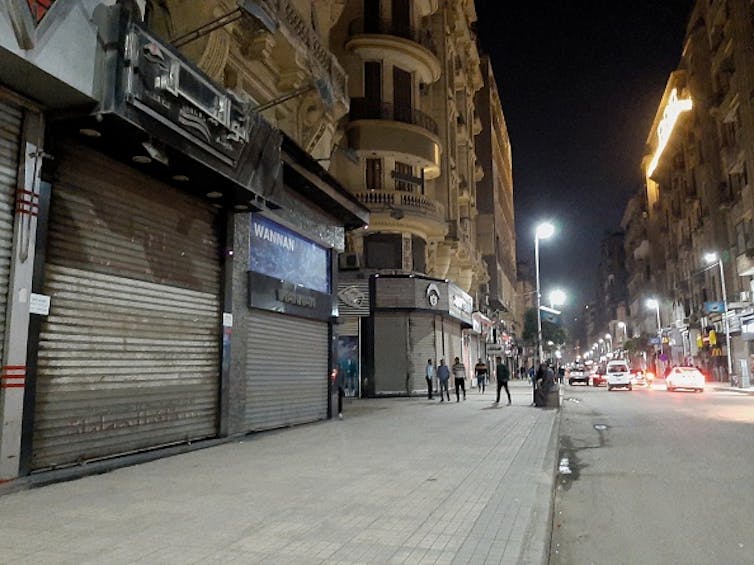- home Home
- keyboard_arrow_right Uncategorized
- keyboard_arrow_right Posts
- keyboard_arrow_rightWhy a one-size-fits-all approach to COVID-19 could have lethal consequences
Why a one-size-fits-all approach to COVID-19 could have lethal consequences
By: Alex Broadbent, University of Johannesburg and Benjamin T H Smart, University of Johannesburg

Photo by Ziad Ahmed/NurPhoto via Getty Images
Suppose you had the choice between two health policies, A and B. Policy A would result in the death of a lot of elderly people. Policy B would result in the death of a lot of children, especially infants. Which would you choose?
Right now we are facing a choice between more or less drastic measures to slow the spread of COVID-19, a virus which, at time of writing, has yet to claim a life under 10, and claims very few lives under 30, with the risk rising exponentially with age. We are putting in place measures that will lead to malnutrition and starvation for millions of people, and for these horrors, children and especially infants are the most at risk. And very many of those infants are born, and will die, in Africa.
Yet there is little discussion of the consequences for human health of the measures we are taking. Nor is there discussion of how the major differences between Africa and America, Europe and Asia might matter. The World Health Organisation (WHO) website contains no technical guidance on how African governments should approach their considerably different contexts. The advice is the same globally, but the context is not.
Failure to recognise that one size does not fit all could have lethal consequences in this region, maybe even more lethal than those of the virus itself.
Social distancing may cost lives in Africa
In Africa, millions will starve if the global economy enters a protracted downturn. We must ask whether the number will be more than COVID-19 will kill in a region where only 6.09% of the population is over 65.
After the 2008 recession, 1 billion people were malnourished, and 5 million more children were hungry in 2010 than they would have been if the recession had not happened. We are only seeing the start of the economic disaster, and therefore the health disaster, that is going to engulf us as a consequence of social distancing measures.
And it’s not just the plunge of some abstract stock market. Tourism employs 1 in 23 employed South Africans. It has evaporated overnight. Bars and restaurants are empty, and, where they serve alcohol, must close early or limit numbers. Football has been shut for the season, and football clubs will go bust. And so on.
Unemployment in South Africa was already nearly 30% in the fourth quarter of 2019. The government lacks both the means and the competence to swiftly dish out grants to SMEs, such as the GBP10,000.00 (about South African R20,000.00) offered by the British government. South African SMEs are already vulnerable. Their employees mostly have no savings, no access to credit (creating hospitable waters for loan sharks), limited assets, and a support network consisting of people in the same boat. Mass unemployment means mass poverty, which means mass starvation.
The crunch question is this: what is the case fatality rate of social distancing in Africa? We have no idea; but that is the figure that should be considered when implementing social distancing measures. The scientific community, including both epidemiologists and economists working together, should be putting as much effort into estimating that case fatality rate as into estimating it for COVID-19.
Social distancing might not work in Africa
It’s not even clear that the social distancing measures will curb the spread of disease here. We know from award winning work on HIV transmission by South African epidemiologists that local social context can neuter a health intervention that is effective elsewhere. So it may be with social distancing.
In a South African township, living conditions are extremely crowded. Socialising is unavoidable. You might as well tell people to emigrate to Mars. In the bubonic plague, the aristocracy left London for the countryside; the poor of London could not isolate themselves, and so they died. This may be our situation.
It is similarly fantastical to expect people who cannot afford food – as will soon be the case for many more – to practice personal hygiene. You can’t eat soap. If you are starving, you won’t buy it.
Thus the major components of the recommended public health measures – social distancing and hygiene – are extremely difficult to implement effectively in much of Africa. The net effect of measures that seek to enforce social distancing may thus be to prevent people from working, without actually achieving the distancing that would slow the spread of the virus. If that is true, then we must consider whether we would be better off without them.
Not all these measures are the same, and nor are preventive measures an all-or-nothing measure. Some degree of social distancing may be possible. Elbow greetings may slow things down. But it’s a fantasy to suppose that the virus can be contained anywhere, and the cost of measures must be proportioned to their likely benefit. The cost of an elbow greeting is low, but the cost of shutting a school is huge.
But even if social distancing here will “flatten the curve”, will it make a difference? The logic of flattening the curve is to bring the peak of the pandemic (the highest number of sick at any one time) down to a manageable level. But this assumes access to healthcare in the first place.
In much of Africa, public healthcare is inaccessible to a huge proportion of the population. Without a miraculously fast overhaul of the continent’s healthcare provision, flattening the curve will make no difference to the majority. Cute as the meme is, its logic does not apply to much of Africa.
What about the children?
Children evoke strong emotions in most of us. Those with children may be worried about their welfare. But children are at very low direct risk from the virus, although of course they are at indirect risk from the economic consequences of pandemic and the death of elderly care-givers. And, in a famine, they are at very high risk of malnutrition and starvation.
We, personally, have elderly relatives whom we care about deeply. But would we actively move children who are otherwise at a minimal risk into a high risk situation, in an attempt to prolong the life of some of those elderly? Would we do so when the effectiveness of those measures is questionable, and the economic effects of those measures (famine) also puts the elderly themselves at risk?
We don’t know. It depends on the data. But we do believe that this is a conversation that we must be brave enough to have.
Many leaders are doubtless aware of their dilemma, but their ability to express this and their ability to make choices is restricted, as the treatment of British leadership shows. In Africa, it’s questionable whether leaders have a political choice, given intense pressure from an international community that isn’t thinking about the differences of the African context, and a WHO offering no region-specific technical advice.
Leaders need to be given the space to say shocking things, to be upfront about what might go wrong, to change their minds in the face of new evidence, and to pick the lesser of two evils.
Doctors face such choices every day, and they are horrible. But they are unavoidable. Without a proper estimation of the costs as well as the benefits of the measures currently being implemented, no rational assessment of their merit can be made.![]()
Alex Broadbent, Director of the Institute for the Future of Knowledge and Professor of Philosophy, University of Johannesburg and Benjamin T H Smart, Associate Professor, University of Johannesburg
This article is republished from The Conversation under a Creative Commons license. Read the original article.
Written by: Natasha
Similar posts
MORE ARTICLES

SA Lotto + Lotto Plus Results for tonight: Wednesday, 02 July 2025

WATCH: Actress, Noxolo Dlamini on starring in the Sarafina play & testing moments as a creative

WATCH: Standard Bank Young Artist Award Winner Modise Sekgothe on Kaya 959 for Youth Week Takeover

Elsa Majimbo on how much she misses living in SA – ‘I miss everything, even the crime’

WATCH: Standard Bank Young Artist Award Winner Muneyi on Kaya 959 for Youth Week Takeover
QUICK LINKS
UpComing Shows

959 Music Weekdays
Kaya 959 Hits
Real. Familiar. Memorable. Kaya 959 brings you the music you know and love from our playlist. Uninterrupted. Thursdays 20h00 to 21h00
close
The Best T in the City
With T Bose
He has held it down in the world of mid-morning radio with the best music, riveting topics, brilliant mixes and interesting guests. Every weekday, The Best T proves why he is the BEST by connecting to you like only your bro or favourite uncle could. He lets his listeners dictate the songs they want to hear in the ever-popular Top 10 at 10, and his Three Teaspoons never run out. Catch The Best T in the City Mondays to Fridays from 09h00 to 12h00.
close
Feel Good
With Andy Maqondwana
Feel good about feeling good! That's exactly what The Feel-Good show is about. An escape from the negativity that surrounds us, indulging you in good feels. Pass it on to one and all. Spread the good feeling around Gauteng with Andy Maqondwana.
close
Kaya Biz
With Gugulethu Mfuphi
The world of business is simplified for you by Kaya Biz with Gugulethu Mfuphi. This fast-paced award-winning business show talks to the corporate giants as well as up and coming entrepreneurs about their wins and challenges. Gugulethu invites guests to offer their analyses of markets and economies, and also delves into issues of personal financial wellness. Kaya Biz airs Mondays to Thursdays 18h00 to 19h00.
close
Point of View
With Phemelo Motene
Point of View with Phemelo Motene delves into the day’s current affairs, touches on real issues that affect people’s daily lives and shares expert advice on questions posed by the audience. Mondays to Thursdays 20:00 to 22:00.
closeConnect with Kaya 959
DownLoad Our Mobile App
© 2025 Kaya 959 | On The Street On The Air










